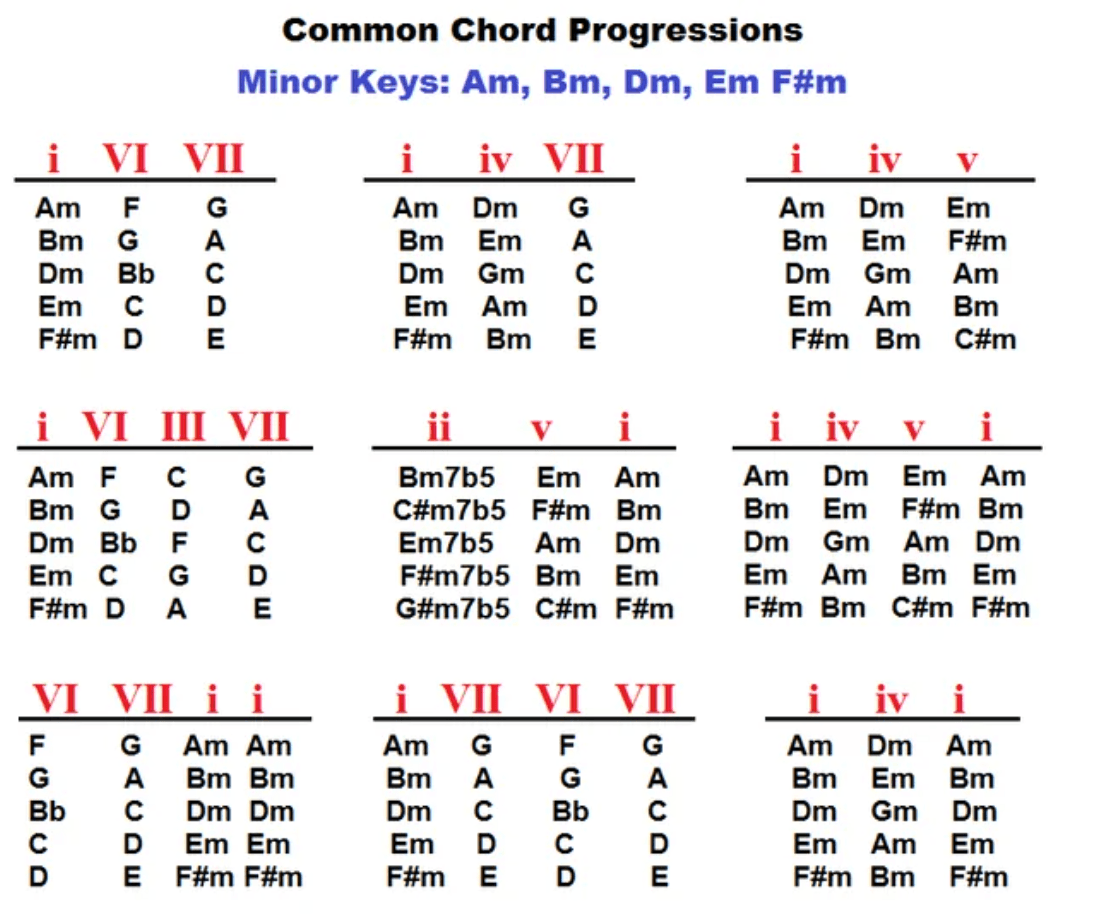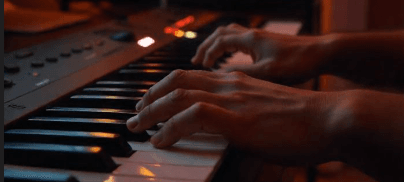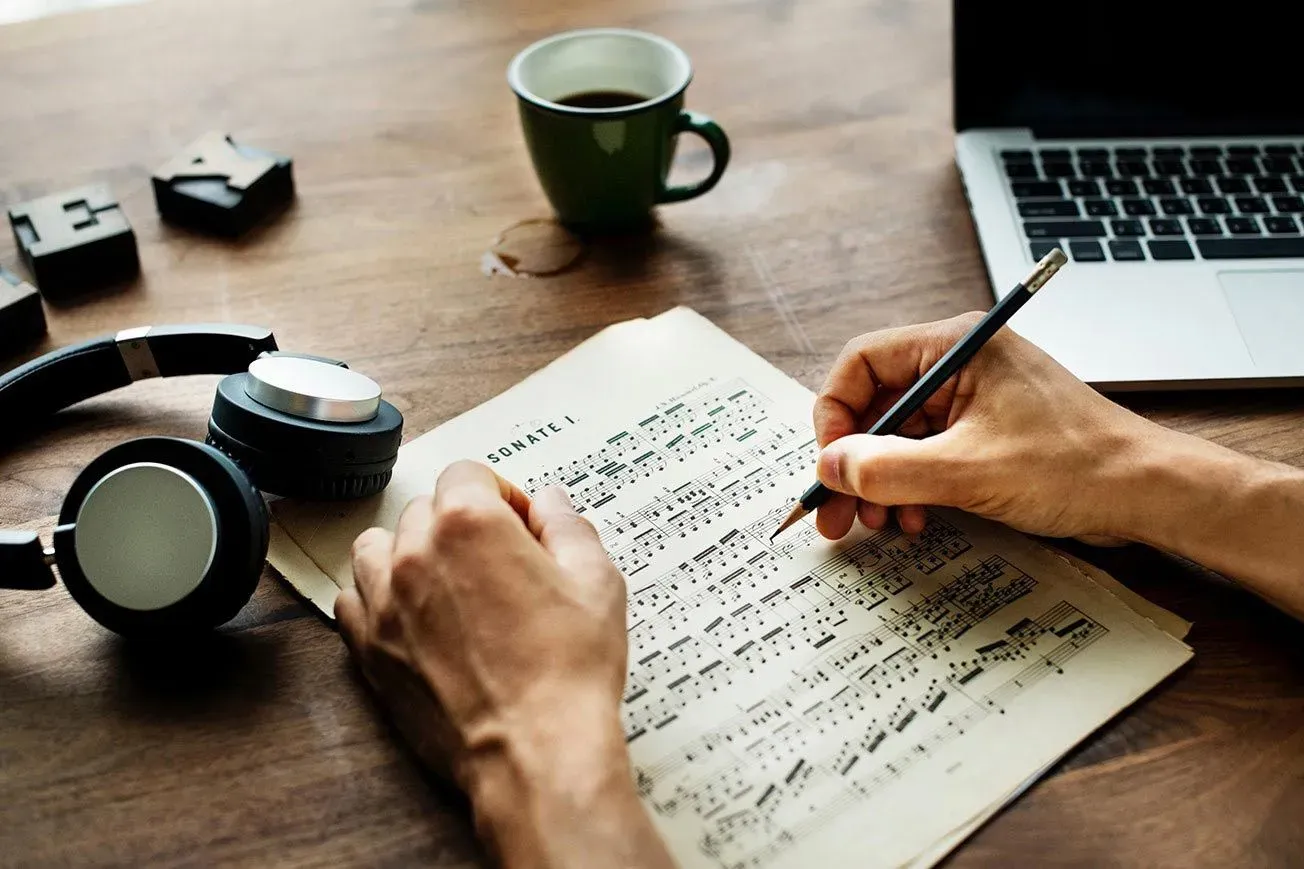Have you ever wondered what an AI music creator is?
It's a game-changing tool that helps both musicians and non-musicians craft beautiful melodies, chord progressions, and even complete songs.
Stick around, because this guide will dig deep into how this revolutionary technology can elevate your music journey.
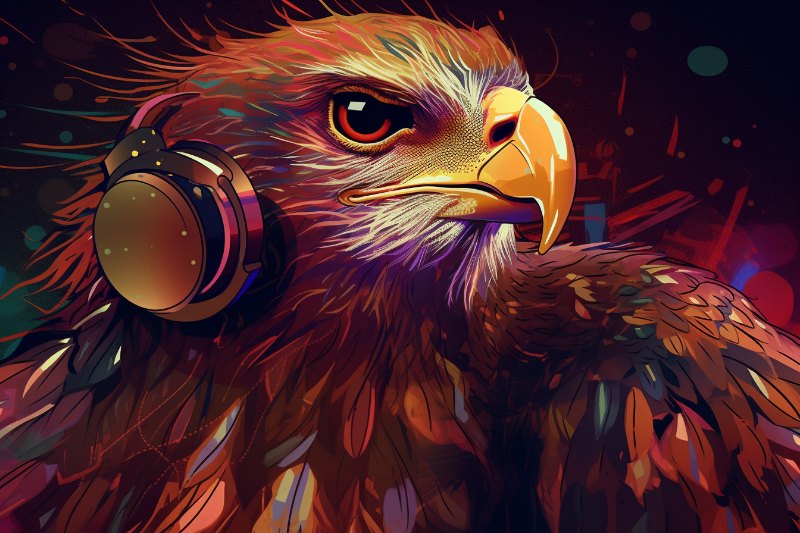
What is an AI Music Creator?
The mention of an AI music creator likely conjures images of automated machines spitting out songs at the push of a button.
Although it may seem like a concept from a futuristic novel, the reality is much more complex and cooperative.
In the following sections, we'll uncover the sophisticated mechanisms behind these tech wonders, examining their potential to stimulate, accelerate, and polish your musical endeavors.
The Partnership: An Assistive Role
First and foremost, AI music creators are designed to assist, not replace, human musicians.
These tools serve as your digital companions in the creative process, offering intelligent suggestions to spark your inspiration or optimize your workflow.
This collaborative feature set ensures you remain the captain of your musical ship, while AI serves as your first mate.
Bridging Gaps
AI music creators can fill in the gaps where you might lack expertise, such as in audio production, beat-making, or melody construction.
By doing so, they help to make the process more inclusive, inviting musicians of all skill levels to contribute creatively.
The Core Technologies: Neural Networks and Algorithms
At the heart of an AI music creator are machine learning algorithms that make it tick.
These algorithms are often designed around neural networks, mimicking the way human brains process information.
The AI is trained on vast datasets comprising countless songs across a range of genres, enabling it to recognize recurring patterns in chord structures, rhythms, and melodies.
Real-time Analysis and Feedback
What sets these AI tools apart is their ability to analyze data in real-time, adjusting their suggestions according to your input.
For instance, if you're trying to create an upbeat pop song, the AI can offer chord progressions that are commonly associated with that genre.
The Database: Musical Elements and Building Blocks
AI music creators often come with extensive databases that serve as their musical vocabulary.
These databases contain a plethora of musical elements, from chord progressions to scale types, that the AI can draw upon to generate or suggest components for your compositions.
Adaptation and Learning
These databases are not static; they continuously update and learn from new data.
This makes the AI tool adaptable, keeping your music in tune with contemporary trends or helping you carve out a completely unique, avant-garde style.
The Final Output: Your Unique Composition
Ultimately, the AI music creator serves to amplify your own creative voice.
Rather than presenting you with a finished product, it offers a multitude of elements and possibilities that you can weave into your final composition.
Whether you're a budding songwriter, an experienced composer, or someone dabbling in audio production, these AI tools provide a new platform for your creativity, making the impossible seem suddenly within reach.
The Ethical Consideration: Ownership and Royalties
While AI music creators offer a revolutionary approach to composition, they also raise questions around ownership and royalties.
It's essential to familiarize yourself with the terms and conditions of the AI platform you're using to sidestep any legal issues.
Generally, you retain the rights to your created compositions, but it's wise to verify this.
An AI music creator serves not merely as a tool but as a collaborative ally in helping you tackle the intricate landscape of music creation.
Through neural networks, algorithms, and an ever-expanding database, these platforms offer an engaging and inclusive musical experience. So, why not take advantage of this technological marvel to unlock new dimensions in your creative journey?
Who Can Use AI Music Creators?
As the technological landscape continues to evolve, tools like AI music creators are no longer confined to the domain of musicians and composers.
Instead, they've broken the barrier to entry, offering a multitude of functionalities that can be tapped into by people from various professional backgrounds.
Whether you're a content creator, marketing specialist, or a developer in the film or gaming industry, these tools can inspire, expedite, and refine your creative output.
Diverse Applications
If you're a YouTuber, podcaster, or blogger, the flexibility and ease of use of AI music creators make them an ideal choice for generating royalty free music.
Forget sifting through stock audio tracks; you can now tailor-make your background tunes to fit the vibe and audience of your content.
Brand Identity
Beyond mere background music, you can even create signature sounds or jingles that contribute to your brand identity. T
hrough real-time feedback and optimization, these AI tools can help you find that unique auditory element that sets you apart.
Advertising and Marketing
In the fast-moving landscape of marketing and advertising, speed is crucial.
AI music creators can swiftly produce engaging jingles or atmosphere-appropriate tunes, far more quickly than the time-consuming processes of contracting a composer or searching through existing music.
Moreover, because you can specify the mood or theme you're going for, these tools can help create music that perfectly aligns with the emotional impact you aim to achieve in your campaigns.
This fine-tuning capability adds a layer of refinement and effectiveness to your marketing strategies.
Film and Game Development
When it comes to adding auditory elements to visual stories, be it in films or digital games, music plays a pivotal role.
AI music creators can assist in composing soundtracks, theme music, or sound effects that add depth and emotion to the narrative.
Resource Optimization
For smaller indie developers, budget and time constraints are often a concern.
Utilizing an AI music creator not only expedites the developmental timeline but also significantly reduces costs.
With these tools, you're essentially getting a pocket-sized, highly adaptive composer that works around the clock.
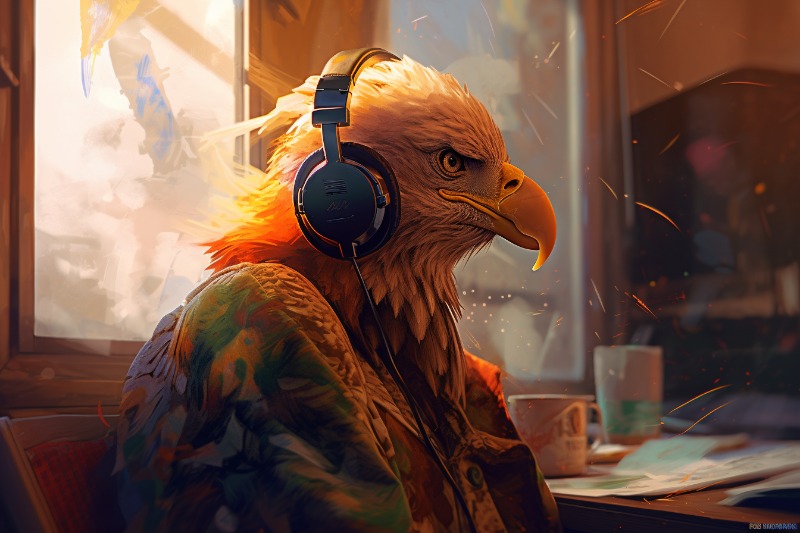
Six Powerful AI Music Creators in 2023
The landscape of AI music creators is ever-evolving, with new innovations appearing at an astonishing pace.
This year, in 2023, the market has become increasingly competitive, offering a plethora of options that cater to different needs and artistic sensibilities.
Whether you're a seasoned musician, a digital content creator, or even someone in marketing or game development, there's likely a perfect AI music tool to inspire, expedite, and refine your creative projects.
Here's a rundown of six powerful AI music creators that are making waves this year.
1. Empress Song Idea Generator
This tool takes your emotional or thematic cues seriously. Simply input the emotion or theme—like "Euphoria" or "Depression"—and Empress Song Idea Generator will commence its algorithmic magic to generate music that aligns seamlessly with your chosen mood.
Because of its emotional tuning, it's an ideal tool for filmmakers or content creators who want to elicit specific emotions from their audience.
2. Mubert
Mubert is more than just a basic music generator. With its API, you can create personalized music experiences.
Additionally, Mubert Studio offers an avenue to monetize your creativity by allowing you to sell AI-generated tracks.
Mubert also excels in user interface design, making it a breeze to set your desired track length, pick a genre, and simply click "Generate Track" to make auditory magic happen.
3. Soundful
For those who prefer a high level of customization, Soundful is a top choice.
The tool gives you granular control over various musical elements, from BPM to key, making it ideal for creators seeking royalty-free music.
Whether you're a YouTuber or podcaster, Soundful can cater to your specific auditory needs without requiring extensive musical knowledge.
4. Aiva
Aiva offers a range of presets and music formats, making it a versatile tool for generating soundtracks across various platforms.
Due to its flexibility, Aiva has become a popular choice not just for individual creators but also for larger production teams in film and gaming.
5. Beatbot
Beatbot stands out for its innovative use of text prompts to create music.
Simply input text that resonates with the vibe you're going for, and Beatbot generates short but original tracks that are uniquely yours.
If you're in a rush or just starting a new project, Beatbot allows for quick musical prototyping, helping to expedite your creative process.
6. Beatoven
Beatoven is designed to make the music creation process as simple as possible.
With just a few clicks, it generates multiple versions of your track, all editable to align with your mood and preferred genre.
This functionality is perfect for those who enjoy the iterative process, offering numerous opportunities to refine and fine-tune your music until it’s just right.
Introducing Empress: A Suite of Premium AI Music Tools
In the rapidly evolving world of music technology, Empress emerges as a front-runner, offering a holistic, premium suite of AI music tools designed to inspire, expedite, and refine your creative process.
From crafting melodious tunes to generating futuristic lyrics, Empress brings you a variety of features that take your musical vision from conception to sonic reality.
Here's a detailed look at what you can expect from this dynamic platform.
1. Melody Mind
Finding the right tune can be a strenuous process, but Melody Mind makes it incredibly effortless.
Just input your preferred instrument, chords, genre, and bpm to craft the perfect melody that resonates with your musical intent.
This feature is particularly beneficial for aspiring musicians who may lack formal training but have a keen sense for musicality.
Even seasoned musicians will find it handy for quick prototyping or when battling creative block.
2. Lyric Lab
If you’ve ever wanted to venture into futuristic, Sci-Fi themes with an ominous tone, Lyric Lab is your go-to tool.
Let your imagination soar while Lyric Lab’s algorithms translate your ideas into spellbinding verses.
This tool can drastically expedite the often time-consuming process of lyric writing, allowing you to focus more on the emotive aspects of your song.
3. Chord Candy
With Chord Candy, you can generate both complex and simple chord structures. Simply input your instrument, key, genre, and bpm, and let the AI work its magic.
Whether you're into jazz, rock, or electronic music, Chord Candy can refine your harmonic structures to align better with your chosen style.
4. Bass Brain
Nothing defines the feel of a song like its bassline. Input the type of bass, chords, genre, and bpm into Bass Brain to begin creating deep, pulsating bass lines that can transform your song's overall vibe.
This feature is excellent for adding depth and emotion to your compositions, particularly in genres like electronic, hip-hop, and R&B.
5. Drums De Dior
Drums De Dior takes away the guesswork from creating intricate drum patterns. Simply input your genre and bpm, and watch as it generates a beat that elevates your song.
While the AI does most of the heavy lifting, you have the freedom to refine the generated beats to suit your specific needs.
6. Harmonious Hitmaker
Ever wondered how to turn your song titles into chart-topping sensations? Harmonious Hitmaker allows you to input the emotion and genre to yield a composition that stands out.
This tool can be invaluable for commercial applications such as advertising jingles or theme songs, helping to inspire catchy and memorable tunes.

Five Examples of AI-Generated Music
As we move further into the digital age, the intersection of artificial intelligence (AI) and music continues to garner attention.
From emulating legendary musicians to spawning entirely virtual stars, AI has become a transformative force in the music industry.
Here are five intriguing examples that demonstrate the expansive capabilities and potential implications of AI-generated music.
1. Savages – AllttA
One of the most groundbreaking moments in AI-generated music was the release of the track “Heart On My Sleeve” by AllttA, a duo consisting of American rapper Mr. J Medeiros and French producer 20Syl. What made the song notable was its uncanny resemblance to a collaboration between Drake and The Weeknd, sparking widespread debate and controversy.
Listeners were astonished to hear a voice resembling Jay-Z’s in the track. While many assumed the legendary rapper had contributed, it was actually AI that mimicked his voice with shocking accuracy.
This audacious venture into AI art raises questions about the ethics and future of machine-generated content, effectively blurring the lines between human artistry and machine-generated work.
2. Not Mine – Miquela
Miquela is not your average 19-year-old. Created by Trevor McFedries and Sara DeCou, Miquela is an AI-powered virtual celebrity who exists purely in the digital realm.
Her music features manipulated vocals and compelling, defiant lyrics set against a backdrop of modern R&B.
It is an excellent example of how AI can be integrated seamlessly into popular music genres.
3. World is Mine – Supercell feat. Hatsune Miku
Another compelling example of AI in music is “World is Mine” by Supercell, featuring Hatsune Miku, a virtual pop idol created by Crypton Future Media using Yamaha Corporation’s Vocaloid software.
Written and composed by Ryo, the founder of Supercell, this song takes us through a narrative of a young girl who demands the world's adoration, reflecting a mix of catchy melodies and emotionally-driven lyrics.
4. Daddy’s Car – Sony CSL Research Lab
Created by Sony's CSL Research Lab, “Daddy’s Car” is a composition that was generated entirely by an AI system named FlowMachines. The project aimed to showcase AI’s capability to emulate popular music styles.
Although the song's music was composed by AI, the lyrics were penned by Benoit Carré, and human musicians performed the track, presenting an intriguing blend of machine learning and human creativity.
5. Break Free – Taryn Southern
“Break Free” is a fascinating example of human-AI collaboration in music. Composed with the help of Amper Music's AI system, Taryn Southern provided the lyrics and melody, while the AI took care of the composition, arrangement, and production.
The result is a unique fusion that reflects the future of music—a future where human emotion and AI efficiency can coexist to create something magical.
Exploring AI's Impact on Music
These examples serve to highlight the burgeoning role of AI in shaping musical experiences and raising pertinent questions about authorship, ethics, and the evolving definition of art.
From mimicking voices to creating new genres, AI-generated music is an exciting frontier, replete with both opportunities and challenges.
Why settle for less?
When you can create stunning, emotionally resonant music effortlessly? Empress is here to make your music dreams a reality.
Click here to unlock your full creative potential today!
FAQs: AI Music Creator
Q1: Is AI-generated music royalty-free?
Most platforms offer royalty-free options, but always check the terms before using the music.
Q2: Can I use AI-generated music for commercial purposes?
Yes, depending on the platform's terms of service.
Q3: How complex can AI-generated music get?
While not as complex as human compositions, advancements in AI offer increasingly intricate options.
Q4: Can AI replace human musicians?
No, AI acts as a tool to assist and inspire musicians but can't replicate human emotion and creativity.
Q5: How long does generating a song usually take?
It varies between platforms but generally takes only a few minutes.
Follow the future of music with Empress. Check out our blog to learn how you can effectively use these AI music tools.
